Measles is rampant, many parents are still indifferent and do not vaccinate their children.
According to doctors, while the measles epidemic is raging, there are still some parents who are "anti-vaccine" and do not realize the importance of vaccinating children to prevent disease.
Risk of measles epidemic during back-to-school season
The school year is coming and from now until the end of the year the weather will gradually cool down, which is a favorable condition for measles to develop. If preventive measures are not quickly implemented, measles will continue to increase.
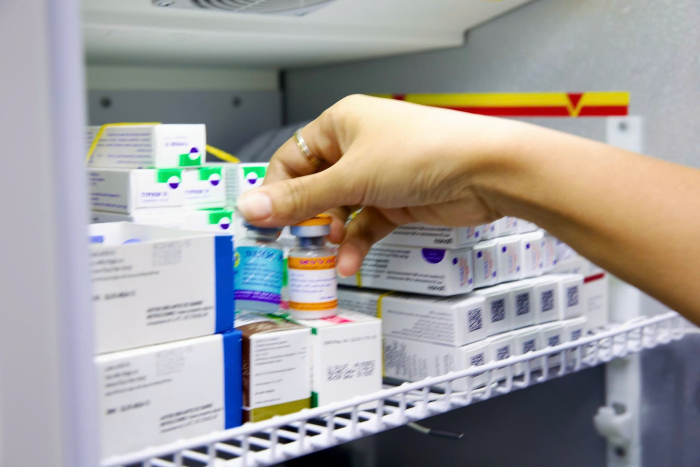 |
| According to doctors, while the measles epidemic is raging, there are still some parents who are "anti-vaccine" and have to do a lot of advocacy . Photo: Chi Cuong |
In Ho Chi Minh City, the epidemic is complicated and increasing, in which more than 90% of measles cases in the South are children under 15 years old, a burden for children's hospitals.
To reduce the risk of the epidemic spreading, a representative of the Ho Chi Minh City Department of Health said that it is necessary to control the epidemic in the community, in schools and hospitals.
In particular, at present, Ho Chi Minh City is implementing cross-vaccination to ensure immunity for children, but according to doctors, there are still some parents who are "anti-vaccine", so a lot of persuasion is needed.
According to Ms. Le Hong Nga, Deputy Director of the Ho Chi Minh City Center for Disease Control, the measles vaccination campaign during this holiday creates favorable conditions for people to arrange their work and take their children for vaccination to prevent disease in children.
In particular, vaccination will protect children who are not old enough to be vaccinated against measles or have serious illnesses that prevent them from being vaccinated.
Ms. Nga noted that for children who are not old enough to be vaccinated or those who cannot be vaccinated due to illness, people around them need to be vaccinated to protect them.
“We need to take preventive measures such as washing hands frequently with soap and water, and people with fever or rash should limit contact with people who have not been vaccinated or have not been vaccinated,” Ms. Le Hong Nga recommended.
Regarding vaccination work in Ho Chi Minh City, Associate Professor, Dr. Tang Chi Thuong, Director of the Department of Health, emphasized the need for HCDCs and district and county health centers to urgently implement activities to strengthen community immunity, while hospitals immediately implement solutions to protect children in risk groups, all aimed at reducing the number of cases and minimizing deaths.
In order for the above groups of solutions to effectively control measles, it is necessary to strengthen communication work so that people can proactively implement disease prevention measures and respond to the vaccination campaign.
At the same time, the Department of Health Inspectorate is required to promptly detect and handle cases of "anti-vaccine" propaganda and cases of providing false information, causing confusion in the community.
Reducing the spread of measles through vaccines
Health experts say measles is considered a global threat because the measles virus of the Paramyxoviridae family spreads rapidly through the respiratory tract from sick people to healthy people in the community or even across borders.
Measles is dangerous because it not only causes acute symptoms but also puts patients at risk of nervous system infections, motor system disorders, damage to multiple organs in the body, and can leave many serious, long-lasting or even lifelong complications for patients such as encephalitis, meningitis, otitis media, pneumonia, diarrhea, corneal ulcers, blindness, etc.
In addition, measles is especially dangerous because it has the ability to erase immune memory, destroying an average of about 40 types of antibodies that can fight pathogens.
In children, a 2019 study by geneticist Stephen Elledge at Harvard University showed that measles eliminates between 11% and 73% of protective antibodies in children.
That is, when infected with measles, the patient's immune system will be destroyed and reset to its original immature, incomplete state like that of a newborn child.
To reduce the risk and prevent a resurgence of measles, WHO emphasizes that vaccination is the only way to protect children and adults from this potentially dangerous disease. Countries around the world are required to achieve and maintain a coverage rate of over 95% with 2 doses of measles vaccine.
Doctor Bui Thi Viet Hoa, Safpo/Potec vaccination system, said that children and adults need to proactively get vaccinated against measles fully and on schedule to help the body produce specific antibodies against the measles virus, helping to prevent the risk of measles and severe complications, with outstanding effectiveness of up to 98%.
In addition, according to Dr. Viet Hoa, each person needs to proactively clean their eyes, nose, and throat with antiseptic solution every day. Limit gathering in crowded places, avoid close contact with people showing signs of measles or suspected of having the disease, and do not share personal items with people with the disease. Keep your living space clean and supplement foods to help strengthen the immune system.
If you experience symptoms of measles (fever, runny nose, dry cough, red eyes, sensitivity to light, rash all over the body), you should quickly go to the nearest medical center or facility for timely examination and treatment.
Anti-vaccination is a global threat
Vaccination is the most effective way to prevent disease. However, in recent times, many people have been indifferent to vaccination and have not yet clearly and fully realized the effectiveness of vaccines.
The anti-vaccination movement is a giant obstacle that threatens to re-emerge diseases that were thought to be extinct, but that could have been prevented.
Anti-vaxxers do not fully understand the benefits of vaccination, they only hearsay or myopically look at a few small incidents. That is why WHO lists anti-vaccination movement as a new global health threat.
According to Dr. Bui Thi Viet Hoa, vaccination not only helps protect a specific individual, but also helps prevent disease for the entire community.
The effectiveness of vaccines is undeniable. This is considered the most effective disease prevention measure to protect the health of vaccinated people and avoid major epidemics that affect the health and lives of the community.
The World Health Organization (WHO) estimates that 85 - 95% of vaccinated people will develop specific immunity to protect their bodies from getting sick, dying or suffering from complications caused by the disease.
Thanks to vaccines, every year, about 2.5 million children worldwide are saved from the risk of death from infectious diseases.
There are now vaccines available for 30 infectious diseases and about 190 countries and territories have introduced universal vaccination programs for all people.
These figures show the benefits of vaccines for society as a whole. According to the WHO, vaccines can help thousands of people avoid disability, save millions of lives worldwide, and save billions of dollars in medical treatment costs each year.
Many studies have shown that the financial burden of medical treatment has significant impacts on each family and society.
When people are fully vaccinated, it will create a healthy community, reduce illness, and reduce the cost of medical examination and treatment over a long period of time.
This will reduce the enormous burden on healthcare, helping to stabilize and improve the quality of life. For example, for every $1 spent on the measles-mumps-rubella vaccine, $21 in healthcare will be saved (according to a report by the US Institute of Medicine).
Source: https://baodautu.vn/soi-hoanh-hanh-nhieu-phu-huynh-van-tho-o-khong-tiem-chung-cho-tre-d223933.html



![[Photo] Prime Minister Pham Minh Chinh and Prime Minister of the Kingdom of Thailand Paetongtarn Shinawatra attend the Vietnam-Thailand Business Forum 2025](https://vphoto.vietnam.vn/thumb/1200x675/vietnam/resource/IMAGE/2025/5/16/1cdfce54d25c48a68ae6fb9204f2171a)

![[Photo] President Luong Cuong receives Prime Minister of the Kingdom of Thailand Paetongtarn Shinawatra](https://vphoto.vietnam.vn/thumb/1200x675/vietnam/resource/IMAGE/2025/5/16/52c73b27198a4e12bd6a903d1c218846)



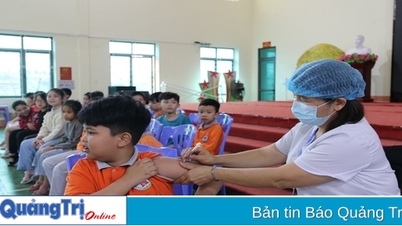

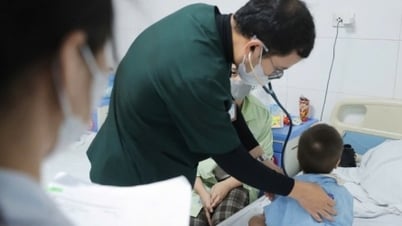
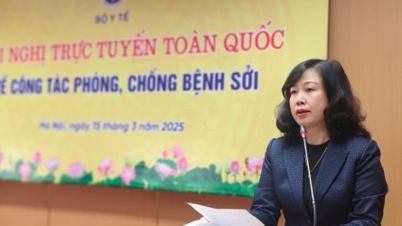
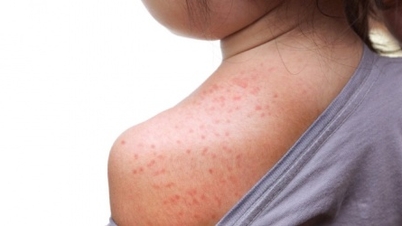
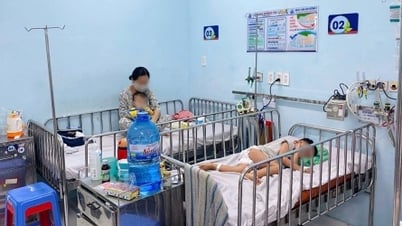






















![[Photo] The Prime Ministers of Vietnam and Thailand witnessed the signing ceremony of cooperation and exchange of documents.](https://vphoto.vietnam.vn/thumb/1200x675/vietnam/resource/IMAGE/2025/5/16/935407e225f640f9ac97b85d3359c1a5)
































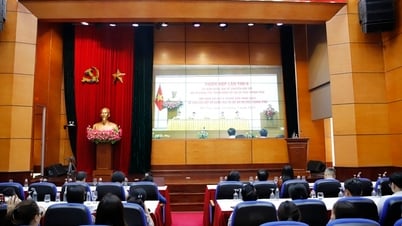
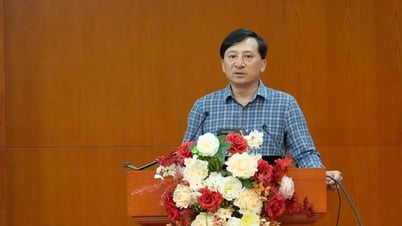
























Comment (0)